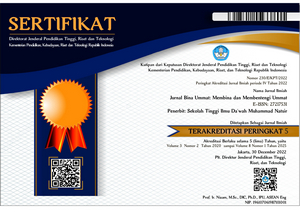KONSEP KOMUNIKASI KEPEMIMPINAN DAKWAH DALAM MENGHADAPI GENERASI DIGITAL
DOI:
https://doi.org/10.38214/jurnaldawahstidnatsir.v4i01.90Keywords:
communication concept, da'wah leadership, digital generationAbstract
Research Objectives: This study aims to find out how the concept of da'wah communication should be carried out by a da'wah leader in facing the digital generation. Research Methodology: Qualitative-Literature. Research Results: from this study it was found that in facing the digital generation, a da'wah leader must pay attention to at least three things in communicating. Namely: first, you must be an example in your life, especially in the context of da'wah. Because the digital generation is a generation that really pays attention to the lives of its characters. Second, da'wah leaders must make maximum use of online media as a medium for preaching to the digital generation. Because the digital generation is a generation that is very familiar with online media. Third, the da'wah leader must have digital literacy in communicating with the digital generation. The three literacies are data literacy, technological literacy and human literacy. So that with this literacy, da'wah leaders can communicate well with the digital generation.
Published
Versions
- 2021-07-30 (3)
- 2021-07-25 (2)
- 2021-06-11 (1)
How to Cite
Issue
Section
This work is licensed under a Lisensi Creative Commons Atribusi 4.0 Internasional.
Authors who publish with this journal agree to the following terms:
- Authors retain copyright and grant the journal right of first publication with the work simultaneously licensed under a Creative Commons Attribution License that allows others to share the work with an acknowledgment of the work's authorship and initial publication in this journal.
- Authors are able to enter into separate, additional contractual arrangements for the non-exclusive distribution of the journal's published version of the work (e.g., post it to an institutional repository or publish it in a book), with an acknowledgment of its initial publication in this journal.
- Authors are permitted and encouraged to post their work online (e.g., in institutional repositories or on their website) prior to and during the submission process, as it can lead to productive exchanges, as well as earlier and greater citation of published work (See The Effect of Open Access).




